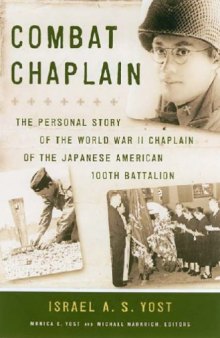 جزییات کتاب
جزییات کتاب
"Who in 1943 could have foreseen that a Lutheran pastor from rural eastern Pennsylvania would be blessed to live and tell such a tale?" In October 1943, twenty-seven-year-old combat infantry chaplain Israel Yost arrived in Italy with the 100th Battalion, a little-known National Guard unit of mostly Japanese Americans from Hawaii. Yost was apprehensive when he learned of his assignment to this unusual unit composed of soldiers with whom he felt he had little in common and who were mostly Buddhists. But this would soon change. Before long, Yost found himself living and working shoulder to shoulder with these men under enemy fire in freezing temperatures and mountainous terrain. In the midst of the difficulties and dangers, he had many opportunities to experience and observe the generosity of the soldiers toward himself and others, including the Italian peasants they encountered. He wrote to his wife of their obsession with finding fresh food to supplement their C-rations, their largely unintelligible Island pidgin, and his friendships with Captain Katsumi Kometani, the battalion’s morale officer and dentist; Captain Jack Mizuha, later a Hawaii Supreme Court justice; and Lieutenant Spark Matsunaga, who would go on to serve many terms as a senator from Hawaii. For the next nineteen months at the frontfrom Salerno to Monte Cassino to Anzio to Bruyeres, FranceYost assisted medics, retrieved bodies from the battlefield, buried enemy soldiers, struggled to bolster morale as the number of casualties rose higher and higher, and wrote countless letters of condolence, all in addition to fulfilling his ministerial duties, which included preaching in the foxholes. Although his sermons won few converts, Yost’s tireless energy and concern for others earned him admiration from his fellow soldiers, who often turned to him as a trusted friend and spiritual advisor. At the war’s end, no other battalion would receive as many decorations and honors as! the 100th. Yost returned to Pennsylvania and the life of a small town pastor. Forty years later, with the help of the letters he had written almost daily to his wife and his field diaries, he wrote of his wartime experiences in the hopes that they might one day be published as a record of the remarkable character and accomplishments of the 100th. Combat Chaplin presents this heartfelt memoir intact with the addition of photographs and subsequent letters and speeches by Yost and other veterans.



 دانلود کتاب
دانلود کتاب

 جزییات کتاب
جزییات کتاب


 این کتاب رو مطالعه کردید؟ نظر شما چیست؟
این کتاب رو مطالعه کردید؟ نظر شما چیست؟
